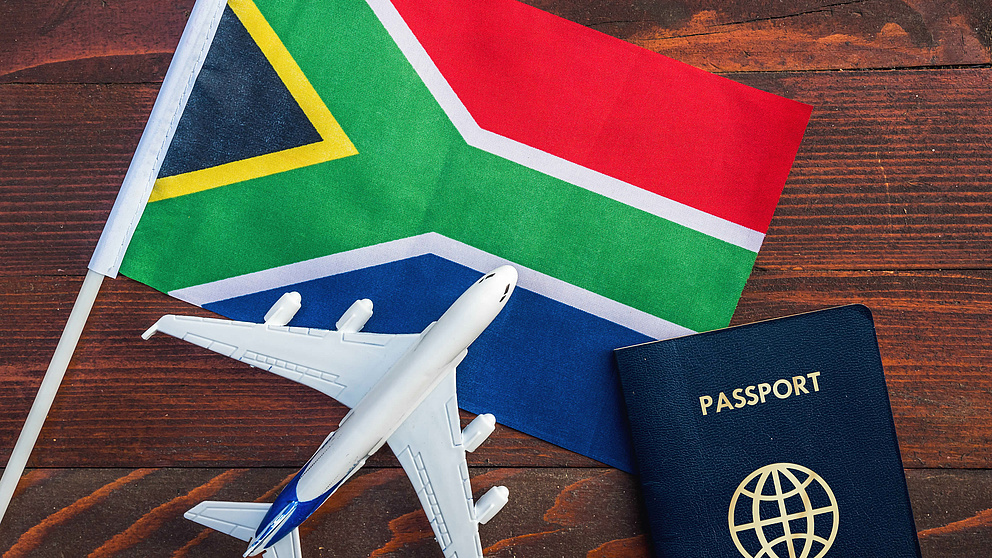

Contact
Press, Communications and Marketing
Tel.: +49 228 833-144
Fax: +49 228 833-441
presse[at]avh.de
After the presence of the Omicron variant of the coronavirus was verified in South Africa, eight countries in southern Africa were immediately categorised as an area of variant of concern and travel restrictions were imposed. Wrongly, according to researchers: After all, this variant is also rife in other countries which haven’t had to suffer any consequences. The repercussions are disastrous for combatting the virus and for ensuring a transparent exchange of information. A conversation with the biologist Anja Buttstedt and the zoologist Yusuf Abdullahi.

Dr. Anja Buttstedt
is a Feodor Lynen Fellow of the Humboldt Foundation at the University of Pretoria in South Africa. Her passion is bees which are also the focus of the research she is conducting in the Social Insects Research Group. She makes her expertise available to the general public on her website www.bienenanja.de.
Humboldt: Ms. Buttstedt, South Africa is regarded as the country where the Omicron variant of the SARS-CoV-2 virus originated. This has led to travel restrictions. Do you think it was wrong to impose them?
Anja Buttstedt: The classification of the nations of southern Africa as areas of variant of concern and the imposition of travel restrictions are discriminatory because the Omicron variant has since been identified in many European countries and a total of 57 countries worldwide.1 In Great Britain it is expected2 that it will soon surpass the Delta variant since it is spreading through many parts of the country. Omicron has even been detected in Iceland and no connection to travel activities could be established.3 You classify either all countries where Omicron has emerged as areas of variant of concern or you don’t classify any. We therefore appeal to the German government to remove the countries of southern Africa from the list of areas of variant of concern.

Dr. Abdullahi A. Yusuf
is the Humboldt Foundation’s Ambassador Scientist in South Africa. He is Anja Buttstedt’s host and teaches zoology and entomology at the University of Pretoria in South Africa.
Mr Abdullahi, what do you want to see from the international community?
Yusuf Abdullahi: Being a Humboldtian, I believe in the values of the Humboldt Network. In a nutshell: excellence and progress arise from collaboration and cooperation. Humboldt is our role model. In his day, he condemned slavery.4 We’ve been living with the pandemic for nearly two years now. We must finally understand that we will defeat it only when we work together. We must take decisions on the basis of facts rather than for political reasons. Exclusion will get us nowhere. On the contrary, travel restrictions impede our ability to fight the pandemic.
What consequences will the travel restrictions have for South Africa?
Anja Buttstedt: The director of South Africa’s Centre for Epidemic Response and Innovation, Tulio de Oliveira, pointed out once again just two days ago5 that South Africa is running out of reagents. Fewer and fewer planes are landing in South Africa. This means that due to the travel restrictions, this country isn’t getting the materials it needs. We’re no longer able to test and do sequencing. This is really exasperating. I hope that nations continue to communicate epidemiological data to the world in future even when they have to expect being met with these kinds of measures.
Yusuf Abdullahi: Yes, we have to remember what consequences these kinds of sanctions have for science communication and international cooperation. The feeling in the science community here is that the messenger is being punished for delivering the message. South Africa was exemplary in immediately communicating what its scientists had discovered. After that, cases of this mutation were detected everywhere else around the world. But a ban was imposed on southern Africa for a few hundred cases! The research community here is anything but happy about that.
1 WHO Media Briefing on 8 December 2021: https://twitter.com/WHO/status/1468606746033737730
2 https://www.nbcnews.com/news/world/omicron-variant-spread-leads-tighter-restrictions-britain-rcna8111
3 https://www.icelandreview.com/news/ten-cases-of-omicron-variant-confirmed/
4 https://www.jstor.org/stable/40402500?seq=1#metadata_info_tab_contents
5 https://www.dailymaverick.co.za/article/2021-12-07-the-jokes-on-us-south-africa-the-cruel-logic-of-omicron-travel-bans-debunked/
https://twitter.com/WHO/status/1468606746033737730
